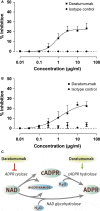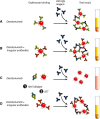Monoclonal antibodies targeting CD38 in hematological malignancies and beyond
- PMID: 26864107
- PMCID: PMC4755228
- DOI: 10.1111/imr.12389
Monoclonal antibodies targeting CD38 in hematological malignancies and beyond
Abstract
CD38 is a multifunctional cell surface protein that has receptor as well as enzyme functions. The protein is generally expressed at low levels on various hematological and solid tissues, while plasma cells express particularly high levels of CD38. The protein is also expressed in a subset of hematological tumors, and shows especially broad and high expression levels in plasma cell tumors such as multiple myeloma (MM). Together, this triggered the development of various therapeutic CD38 antibodies, including daratumumab, isatuximab, and MOR202. Daratumumab binds a unique CD38 epitope and showed strong anti-tumor activity in preclinical models. The antibody engages diverse mechanisms of action, including complement-dependent cytotoxicity, antibody-dependent cellular cytotoxicity, antibody-dependent cellular phagocytosis, programmed cell death, modulation of enzymatic activity, and immunomodulatory activity. CD38-targeting antibodies have a favorable toxicity profile in patients, and early clinical data show a marked activity in MM, while studies in other hematological malignancies are ongoing. Daratumumab has single agent activity and a limited toxicity profile, allowing favorable combination therapies with existing as well as emerging therapies, which are currently evaluated in the clinic. Finally, CD38 antibodies may have a role in the treatment of diseases beyond hematological malignancies, including solid tumors and antibody-mediated autoimmune diseases.
Keywords: CD38; cancer; daratumumab; isatuximab; multiple myeloma; therapeutic antibody.
© 2016 Genmab, Utrecht, the Netherlands. Immunological Reviews published by John Wiley & Sons Ltd.
Figures



References
-
- Katz F, et al. Chromosome assignment of monoclonal antibody‐defined determinants on human leukemic cells. Eur J Immunol 1983;13:1008–1013. - PubMed
-
- Ferrero E, Malavasi F. Human CD38, a leukocyte receptor and ectoenzyme, is a member of a novel eukaryotic gene family of nicotinamide adenine dinucleotide+‐converting enzymes: extensive structural homology with the genes for murine bone marrow stromal cell antigen 1 and aplysian ADP‐ribosyl cyclase. J Immunol 1997;159:3858–3865. - PubMed
-
- Kosco‐Vilbois MH. Are follicular dendritic cells really good for nothing? Nat Rev Immunol 2003;3:764–769. - PubMed
-
- Musso T, et al. CD38 expression and functional activities are up‐regulated by IFN‐gamma on human monocytes and monocytic cell lines. J Leukoc Biol 2001;69:605–612. - PubMed
Publication types
MeSH terms
Substances
LinkOut - more resources
Full Text Sources
Other Literature Sources
Medical
Research Materials

